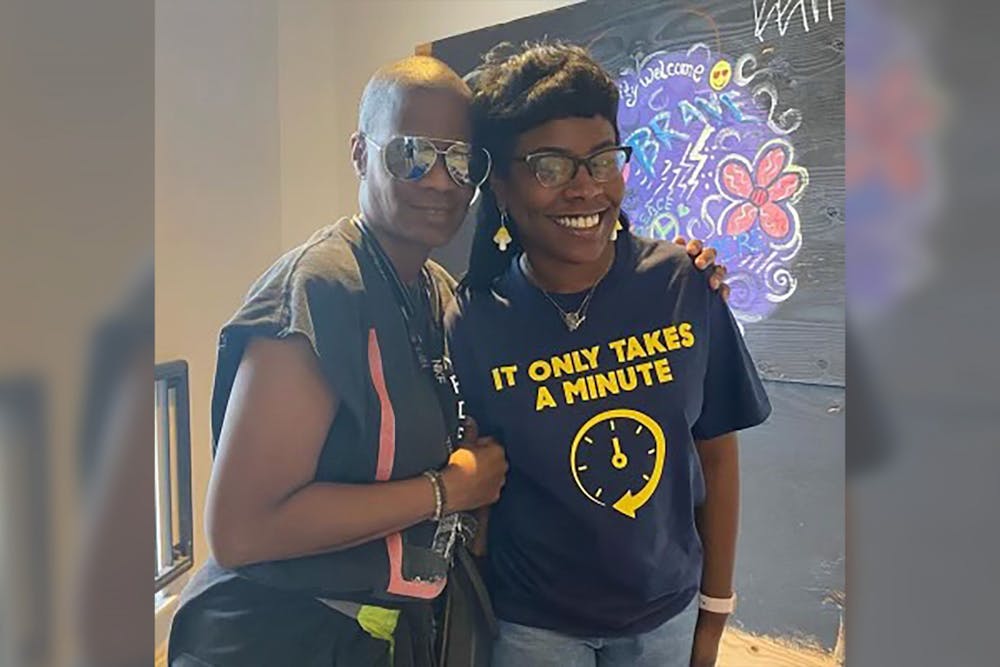Editor's note: Some language in this story has been updated.
Dec. 1 marked the first day of HIV/AIDS awareness month, which is intended to raise awareness of the condition caused by HIV and mourn those who’ve died from it.
While there have been many efforts to raise awareness and educate people about the disease, there have been harmful social stigmas circulating about the virus. It’s time we remove the stigmas around HIV/AIDS within our communities.
In 1981, the HIV/AIDs epidemic began, and over the years, there have been preventative measures and treatments to help those living with it according to, HIV.gov. It’s been 40 years since, and with all of the efforts and technological advancements, a lot of people still don’t know much about HIV/AIDS.
Black Voices: Alice Sebold versus Anthony Broadwater
HIV — human immunodeficiency virus — attacks and destroys T helper cells, which work to defend your body against infections. This virus leaves your body vulnerable to contracting other diseases and infections.
It can be spread by sharing needles or through fluids containing HIV, excluding saliva. It also can be passed from mother to child during and after pregnancy through breastfeeding, according to the Centers for Disease Control and Prevention.
HIV advances in stages and gets worse over time if a person is unaware they’ve been infected or doesn’t seek treatment as soon as possible. According to HIVinfo.NIH.gov, the stages are acute, chronic and AIDS. The AIDS stage leaves a person’s body vulnerable to life-threatening or fatal diseases, including cancer, if the immune system becomes severely damaged.
The virus primarily affects Black men who have sex with men, people who inject drugs, and Black heterosexual women. This can be attributed to the government’s failure to provide accurate information to the public.
According to Avert, stigma and myths surrounding HIV cause those with the virus to feel like their status is a death sentence they even face discrimination. Some have internalized stigma that leads to feelings of shame to keep their status a secret.
These stigmas and miseducation also promoted homophobia to the point that HIV was called the “Gay Disease.” During the 80s and 90s, people began to distance themselves from gay people and shun them because of it.
A lot of people are blind to the fact that, currently, cisgender heterosexual Black women are disproportionately affected by the virus. This is attributed to lack of access to healthcare, education and stigma.
Current IU sophomore and LBGTQ advocate Chris Moore said they believe more education is a major part of the solution to removing stigma.
“Being gay, Black and Latinx, I’ve dealt with a multitude of homophobia within my community,” Moore said. “We have to educate.”
It took those who were diagnosed with HIV and Aids as well as other allies to stand in protest for the government to take the virus seriously. Their advocacy led to many advancements such as PrEP — Pre-exposure prophylaxis — and medicines that help the virus stay at a low viral load.
However, stigmas still exist.
IU alumna Taylor M. Akers is a former HIV outreach & engagement specialist and now a sexual health educator at Global Protection Corp. She said there has to be a willingness to talk and ask questions about sex in order to combat the stigma, especially in Black communities.
“As a little girl, when I would ask those questions related to sex, the response I got back made me feel like I wasn’t supposed to ask these questions,” Akers said.
Black Voices: U.K. and U.S. teachers strike back for better wages
Talking about sex in Black communities shouldn’t be taboo; sex should be talked about when a child is old enough to comprehend it.
Talking about sex with kids and teens can be an awkward conversation, but it is essential to sex education. Parents, guardians and mentors don’t have all the answers, but sex education should start in an environment where you feel most comfortable.
It is universities’ and schools’ duty to foster this knowledge and talk about it. College students are one of the most vulnerable populations to contract HIV/AIDS. According to HIV Prevention Trials Network, young people ages 15 to 24 years account for more than 30% of all new HIV infections globally.
While IU has organizations, like the Sexual Health Advocacy Group, on campus to promote healthy sex, there is still more that can be done.
Talking about sexual health could help with the efforts to combat HIV/AIDs and also help with creating safe spaces for people who have been diagnosed with the virus to feel secure enough to talk about their status.
It’s not just the responsibility of those living with HIV/AIDS to advocate — it’s everyone’s job.
Below is a set of resources and information provided by Taylor M. Akers about HIV and AIDS for students on campus, Black women and Latinx women.
On Campus Resources:
IUB Student Organizations:
Sexual Health Advocacy Group (SHAG) @shagiub
Peer Health and Wellness Educators (PHWE)
Off Campus (Bloomington) Resources:
Futures Family Planning Clinic
The Backdoor Bar 21+ (HIV, Chlamydia & Gonorrhea testing 1st Thursdays monthly 7pm-10pm)
Black Women and HIV Resources:
Black Americans and HIV/AIDS: The Basics | KFF
Black AIDS Institute – A leader in ending the HIV epidemic in Black America.
Black Women’s PrEP Toolkit – Black AIDS Institute
Latinx Resources:
Latinos and HIV: Cultural Issues in AIDS Prevention (ucsf.edu)
Latina researcher breaks sexual taboos in an effective HIV prevention program (nbcnews.com)
Fact Sheet: The State of Latinas in the United States - Center for American Progress
https://www.latinoaids.org/prep.php
PrEP for Women:
Black Women, HIV, and PrEP: Confronting Barriers to Care (thebody.com)
Ready, Set, PrEP (getyourprep.com)
What Encourages Black and Latinx Trans Women to Take PrEP? (thebodypro.com)
Other PPTS:
Track Presentation Meeting (b8cdn.com)
1616613662myriam-johnstone-nmac-presentation-pdf1616613662.pdf (b8cdn.com)






